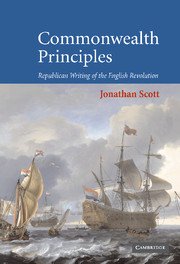7 - Liberty
Published online by Cambridge University Press: 22 September 2009
Summary
[T]he cause for which you were trusted was to defend and maintain the peoples right to make laws for themselves, and thereby provide for their own welfare and safety, by such persons as they should chuse, and that without the negative controule of the King; and also to defend the freedome of their consciences, persons, and estates, in being over the only government[sic] of their own laws, without subjection to the will or mercie of any man.
The Armies Dutie (May 1659)INTRODUCTION
English republicanism defined itself primarily in relation, not to constitutional structures, but moral principles. It was of these which Milton spoke when he praised ‘fortitude and love of freedom … wisdom … valour, justice [and] constancy’, and Vane when he wrote to Harrington ‘joyning in witness with you … unto those principles of common right and freedome, that must be provided for, in whatsoever frame of Government it be’. These constituted the moral philosophy of English republicanism: the positive moral good it proposed to itself.
One aspect of this moral philosophy concerned means. Whatever its constitutional form, the citizens of a republic were free. This freedom was, in the words of Milton, ‘the only school of virtue’. Recently Quentin Skinner has identified within these English writings a ‘third theory of liberty’, distinct from both the Greek positive liberty identified by Pocock and the negative liberty associated with natural law language (liberalism).
- Type
- Chapter
- Information
- Commonwealth PrinciplesRepublican Writing of the English Revolution, pp. 151 - 169Publisher: Cambridge University PressPrint publication year: 2004
- 1
- Cited by



